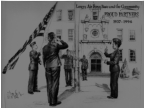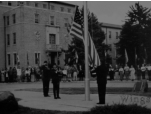


LOWRY AFB
The History
Lowry’s Buildings
These
are
buildings
erected
during
the
existence
of
Lowry
Field/Lowry
AFB
from
its
beginnings
in
1937
through
its
end-of-life
in
1994.
Lowry
was
a
bustling
“town”
in
and
of
itself
within
the
eastern
confines
of
Denver,
forming
a
“boundary”
between
Denver
and
its
eastern-neighbor,
Aurora,
CO.
Aurora
evolved
from
the
small
1891
community
known
as
Fletcher,
a
four
square
mile
real
estate
investment,
into
a
thriving
bedroom
community
serving
both
military
and
civilian
families
associated
with
Lowry
AFB.
Aurora
is
today
so
much
more
than
a
bedroom
community
as
it
has
attained
the
status
of
having
become
the
21st
most
populous
Metropolitan
Statistical
Area
in
the
United
States.
Click
HERE
to view the Lowry Foundation’s online version of these same photos.
Last Updated: 01/06/2018 08:01
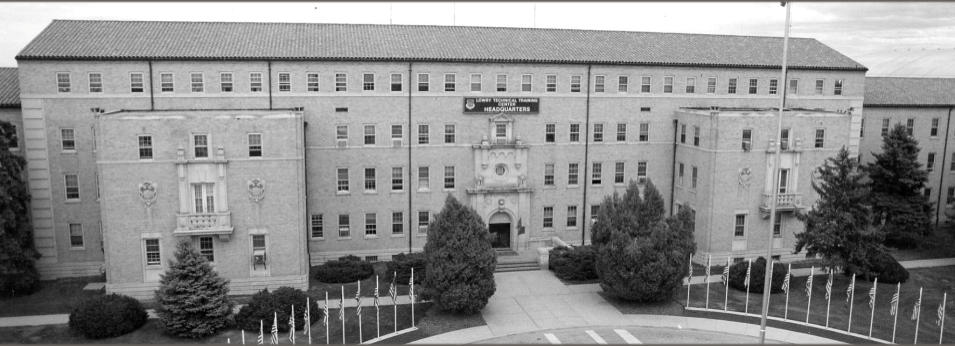

Available
housing
for
Lowry’s
Army
Air
Force
soldiers
ranged
from
large
tents
in
1937
when
the
area
was
known
as
“Lowry
Field”
to
modern-day
advanced
architectural
designs
which
included
during
the
latter
years
1,000-man
dormitories
as
Lowry
Field
transitioned
into
Lowry
AFB,
United
States
Air
Force’s
Air
Training
Command.
Buildings
were
erected
in
the
form
of
aircraft
hangers,
a
steam
plant,
office
buildings,
and
classrooms.
A
dining
hall,
book
store,
commissary,
dispensary,
dental
clinic,
officer
and
enlisted
clubs,
theater,
PX/BX,
on-base
housing…were
all
built to form a complete community in support of the Air Force’s training mission at Denver, Colorado.
Lowry’s
flying
activities
ceased
on
30
June
1966.
In
1991
the
government’s
Base
Realignment
and
Closure
(BRAC)
commission
recommended
closing
Lowry
AFB.
Lowry
AFB
had
been
home
to
over
one
million
airmen
during
its
existence,
including
not
only
America’s
finest
men
and
women,
but
students
from
over
29
foreign
countries
were
provided
training
at
Lowry
AFB
through
the
military’s
MAP
program.
On
30
September
1994
the
United
States
of
America’s
flag
was
lowered
for
the
last
time
in
front
of
building
349,
the
Base
Headquarters
building,
and
Lowry
AFB
ceased to exist as a government installation, ending 57 years of training excellence.
Politicians
and
influential
business
leaders
from
both
Denver
and
Aurora,
CO
got
together
and
evolved
a
plan
to
maximize
the
potential
value
of
the
now
abandoned
property.
A
vibrant
mixed-use
community
evolved
embracing
the
area’s
unique
military
history.
Over
20
original
Lowry
AFB
buildings
have
been
saved
and
repurposed.
Other
buildings,
those
of
less
robust
construction,
were
demolished
with
new
construction
taking
their
place.
The
whole
area
has
taken
on
a
new
look…such
that
if
a
veteran
who
served
on
Lowry
in
1982
were
to
visit
the
area
in
2016…they
would
no longer recognize the Lowry where they had spent a significant portion of their service career time!
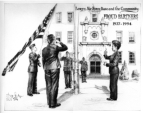

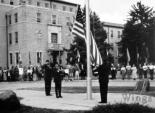





Lowry AFB
The History

Lowry’s Buildings
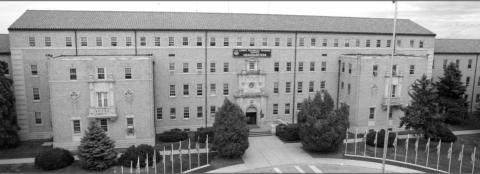
Available housing for Lowry’s Army Air Force soldiers ranged from
large tents in 1937 when the area was known as “Lowry Field” to
modern-day advanced architectural designs to include 1,000-man
dormitories during the latter years as Lowry Field transitioned into
Lowry AFB as part of the United States Air Force’s Air Training
Command. Buildings were erected in the form of aircraft hangers, a
steam plant, office buildings, and classrooms. A dining hall, book
store, commissary, dispensary, dental clinic, officer and enlisted
clubs, theater, PX/BX, on-base housing…were all built to form a
complete community in support of the Air Force’s training mission at
Denver, Colorado.
Lowry’s
flying
activities
ceased
on
30
June
1966.
In
1991
the
g
o
v
e
r
n
m
e
n
t
’
s
Base
Realignment
and
Closure
(BRAC)
commission
recommended
closing
Lowry
AFB.
Lowry
AFB
had
been
home
to
over
one
million
airmen
during
its
existence,
including
not
only
America’s
finest
men
and
women,
but
students
from
over
29
foreign
countries
were
provided
training
at
Lowry
AFB
through
the
military’s
MAP
program.
On
30
September
1994
the
United
States
of
America’s
flag
was
lowered
for
the
last
time
in
front
of
building
349,
the
Base
Headquarters
building,
and
Lowry
AFB
ceased
to
exist
as
a
government
installation,
ending
57
years of training excellence.
Politicians and influential business leaders from both Denver and
Aurora, CO got together and evolved a plan to maximize the
potential value of the now abandoned property. A vibrant mixed-use
community evolved embracing the area’s unique military history.
Over 20 original Lowry AFB buildings have been saved and
repurposed. Other buildings, those of less robust construction, were
demolished with new construction taking their place. The whole area
has taken on a new look…such that if a veteran who served on Lowry
in 1982 were to visit the area in 2016…they would no longer
recognize the Lowry where they had spent a significant portion of
their service career time!
These are buildings erected during the existence of Lowry
Field/Lowry AFB from its beginnings in 1937 through its end-
of-life in 1994. Lowry was a bustling “town” in and of itself
within the eastern confines of Denver, forming a “boundary”
between Denver and its eastern-neighbor, Aurora, CO. Aurora
evolved from the small 1891 community known as Fletcher, a
four square mile real estate investment, into a thriving
bedroom community serving both military and civilian
families associated with Lowry AFB. Aurora is today so much
more than a bedroom community as it has attained the
status of having become the 21st most populous
Metropolitan Statistical Area in the United States. Click HERE
to view the Lowry Foundation’s online version of these same
photos.


